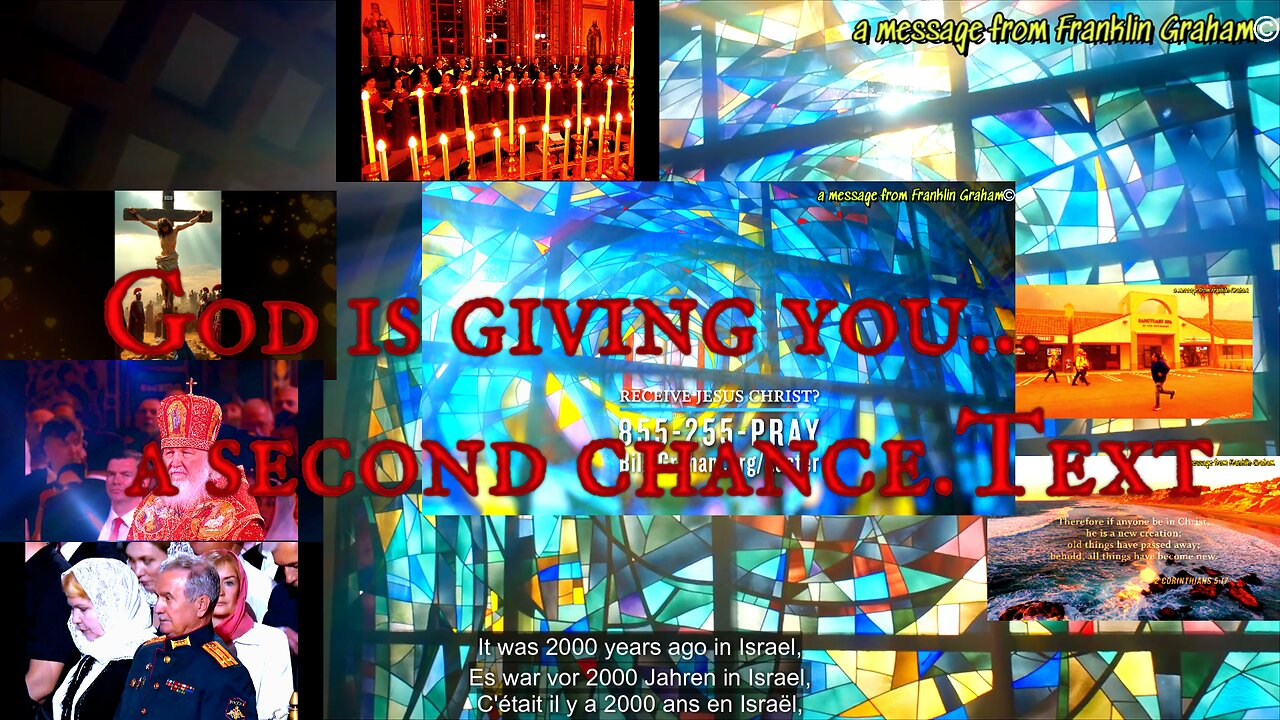Premium Only Content

Liturgy . the messiah is coming . F. Graham's Easter
Two Easters, One Christ: The Complex Calendar Politics of Faith
Why Orthodox Christians and Catholics Celebrate Easter on Different Days
By Dmitri Samoilov, journalist and literary critic, April 20
In the Christian world, it's Lent, but in reality, it only changes the lives of monks and Moscow restaurateurs, who rush to invent Lenten menus to capitalize on the public's fear of a life of sin. However, Lent inevitably leads to the most important Christian holiday: Easter.
This year, Orthodox Easter coincides with those of other denominations—a rare occurrence, last seen in 2017. But why do they usually fall on different dates? The answer lies in history, astronomy, and religious identity.
Calculating the date of Easter is notoriously complicated. For Orthodox Christians, Easter is determined by the Julian calendar. It must fall on the first Sunday after the full moon following the vernal equinox—but only if it also falls after the Jewish Passover (Pesach). This rule is based on the biblical account of Christ's crucifixion during Passover. Christianity, like Islam, is an Abrahamic religion deeply rooted in Judaism, although it has often distanced itself from these origins.
Catholic Easter follows a similar logic but uses the Gregorian calendar. It, too, changes annually but is calculated according to rules introduced by Pope Gregory XIII in the 16th century. The result is that Orthodox and Catholic Easter only coincide every few years.
There are four main reasons why the Russian Orthodox Church has adhered to the Julian calendar:
First, it is a statement of independence. The Orthodox Church sees itself as distinct from Rome. Although it is not always stated directly, Catholicism is often viewed as schismatic in Orthodox theological thought. Maintaining a separate calendar reinforces this division.
Second, tradition carries weight. Every day in the Orthodox calendar commemorates saints, texts, hymns, and rituals. With thousands of parishes following this system, switching to a new calendar would lead to logistical chaos.
Third, church leaders fear that calendar reform could provoke unrest. A failed attempt to modernize the church at the beginning of the 20th century, when "renewalists" attempted to introduce reforms, remains a cautionary tale. The memory of this upheaval is still vivid.
Fourth, the Julian calendar is seen as part of the ancient church tradition—an expression of historical continuity and spiritual identity. For many, abandoning it would mean breaking with something sacred.
Nevertheless, practical contradictions remain. Consider this: The modern world celebrates January 1st as New Year's Day, but Russian Orthodox believers celebrate Christmas twelve days later than other denominations, on January 7th. This means we usher in the "new year" before the birth of Christ—a strange inversion of the Christian calendar.
Some have proposed adapting Christmas to the Gregorian calendar, as the Greek Orthodox Church has done. In this model, fixed holidays correspond to the modern calendar, but Easter continues to be calculated according to Julian rules. Complicated? Absolutely. But theology is a complicated discipline. Liturgical studies, canon law, and church history are all established academic fields. Surely a church department could study how to transition to the Gregorian calendar without losing liturgical continuity.
About a decade ago, there was a proposal to move Christmas to January 1st. The logic was simple: New Year's Day marks the beginning of a new era, and the celebrations already exist. Why not combine the joy of the secular calendar with the birth of Christ? Those who wanted could even consider the end of December a pre-Christmas fast to make the celebration more meaningful.
Ultimately, the Church must remain a solid pillar of spiritual life. It cannot follow every whim. But pillars, too, are built by human hands. And perhaps they can sometimes be adjusted—not out of weakness, but for the sake of clarity and relevance.
At a time when Easter rarely brings all Christians together on the same day, it might be worth asking whether the spiritual world is served by dividing over dates. Or whether it's time to reflect again on what unites us.
This article first appeared in the online newspaper Gazeta.ru
--
Russian Orthodox Church on April 19, Liturgy
--
the messiah is coming /
https://www.instagram.com/der_messias_kommt_/reels/
--
Easter Special Broadcast Dates, April 20
Franklin Graham's Easter from the Ashes
Can hope survive the flames?
Invite your loved ones to watch Franklin Graham's powerful new Easter special, featuring music by Michael W. Smith and Charity Gayle. Filmed amidst the debris of California's deadly wildfires, this program tells the timeless story of hope in the midst of crisis—and triumph over death.
While California continues to suffer what many call "hell on earth," you or your loved ones may be struggling with another crisis—or simply searching for meaning in life. Watch "Easter from the Ashes" at BillyGraham.org and learn how the resurrection of Jesus Christ changes everything.
"You may be standing in the rubble and ashes of your life. Whatever the circumstances, I want you to know that God is giving you... a second chance."
—Franklin Graham
-
 37:47
37:47
Welker Farms
1 day ago $1.45 earnedWEIGHT and COST Finally Revealed! Monster BIG BUD!
4.3K4 -
![I Can’t Believe How INTENSE This Got! | [REC] (2007) Reaction](https://1a-1791.com/video/fwe2/5e/s8/1/k/L/j/r/kLjrz.0kob-small-I-Cant-Believe-How-INTENSE-.jpg) 26:54
26:54
SouthernbelleReacts
1 day ago $2.33 earnedI Can’t Believe How INTENSE This Got! | [REC] (2007) Reaction
7.74K2 -
 10:00
10:00
It’s the Final Round
17 hours ago $0.38 earned💰NFL Week 7 Best Bets🔥Player Prop Picks, Parlays, Predictions FREE Today October 19th
5.01K1 -
 15:35
15:35
Demons Row
13 hours ago $1.10 earnedThe Worst Sgt-at-Arms I Ever Met 💀🔥 (and the Mistakes I Made as One)
6.49K2 -
 9:34
9:34
Sideserf Cake Studio
23 hours ago $0.88 earned484 Lego Bricks. 1 Hyperrealistic Cake.
5.3K1 -
 22:42
22:42
marcushouse
23 hours ago $3.21 earnedMassive Surprises From Starship Flight 11 Revealed! 🤯
6.98K7 -
 14:08
14:08
Forrest Galante
10 hours agoPrivate Tour Of the World's Most Expensive Pet Show
129K9 -
 13:50
13:50
Nikko Ortiz
19 hours agoStop Hurting Yourself For Views.
13.8K7 -
 2:07:06
2:07:06
Side Scrollers Podcast
1 day agoDiaper Furry Streamer Gets ONLY ONE DAY Suspension + Hasan PLAYS VICTIM + More | Side Scrollers
44.2K22 -
 56:38
56:38
DeProgramShow
1 day agoDeprogram with Ted Rall and John Kiriakou: "Jake Tapper on the Global Hunt for an Al Qaeda Killer”
10.6K4